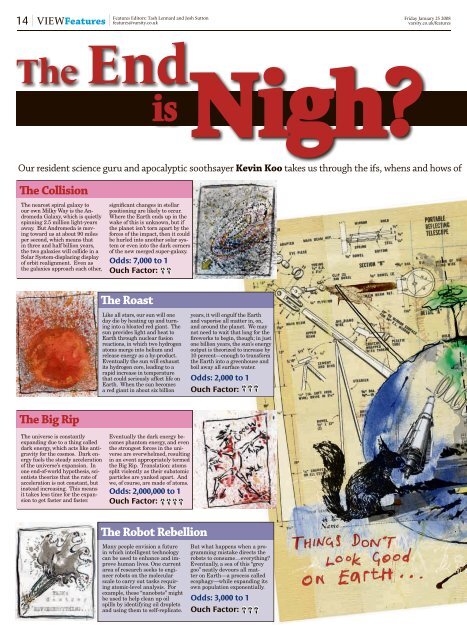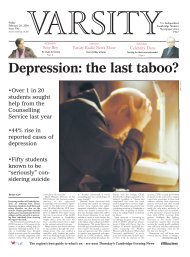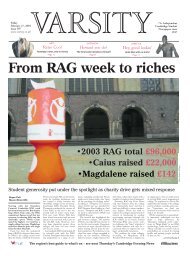Food & Drink Face Off Interview - Varsity
Food & Drink Face Off Interview - Varsity
Food & Drink Face Off Interview - Varsity
Create successful ePaper yourself
Turn your PDF publications into a flip-book with our unique Google optimized e-Paper software.
14<br />
VIEWFeatures<br />
Features Editors: Tash Lennard and Josh Sutton<br />
features@varsity.co.uk<br />
Friday January 25 2008<br />
varsity.co.uk/features<br />
The End<br />
is Nigh<br />
Our resident science guru and apocalyptic soothsayer Kevin Koo takes us through the ifs, whens and hows of<br />
The Collision<br />
The nearest spiral galaxy to<br />
our own Milky Way is the Andromeda<br />
Galaxy, which is quietly<br />
spinning 2.5 million light-years<br />
away. But Andromeda is moving<br />
toward us at about 90 miles<br />
per second, which means that<br />
in three and half billion years,<br />
the two galaxies will collide in a<br />
Solar System-displacing display<br />
of orbit realignment. Even as<br />
the galaxies approach each other,<br />
significant changes in stellar<br />
positioning are likely to occur.<br />
Where the Earth ends up in the<br />
wake of this is unknown, but if<br />
the planet isn’t torn apart by the<br />
forces of the impact, then it could<br />
be hurled into another solar system<br />
or even into the dark corners<br />
of the new merged super-galaxy.<br />
Odds: 7,000 to 1<br />
Ouch Factor:<br />
The Roast<br />
Like all stars, our sun will one<br />
day die by heating up and turning<br />
into a bloated red giant. The<br />
sun provides light and heat to<br />
Earth through nuclear fusion<br />
reactions, in which two hydrogen<br />
atoms merge into helium and<br />
release energy as a by-product.<br />
Eventually the sun will exhaust<br />
its hydrogen core, leading to a<br />
rapid increase in temperature<br />
that could seriously affect life on<br />
Earth. When the sun becomes<br />
a red giant in about six billion<br />
years, it will engulf the Earth<br />
and vaporise all matter in, on,<br />
and around the planet. We may<br />
not need to wait that long for the<br />
fireworks to begin, though; in just<br />
one billion years, the sun’s energy<br />
output is theorized to increase by<br />
10 percent—enough to transform<br />
the Earth into a greenhouse and<br />
boil away all surface water.<br />
Odds: 2,000 to 1<br />
Ouch Factor:<br />
The Big Rip<br />
The universe is constantly<br />
expanding due to a thing called<br />
dark energy, which acts like antigravity<br />
for the cosmos. Dark energy<br />
fuels the steady acceleration<br />
of the universe’s expansion. In<br />
one end-of-world hypothesis, scientists<br />
theorize that the rate of<br />
acceleration is not constant, but<br />
instead increasing. This means<br />
it takes less time for the expansion<br />
to get faster and faster.<br />
Eventually the dark energy becomes<br />
phantom energy, and even<br />
the strongest forces in the universe<br />
are overwhelmed, resulting<br />
in an event appropriately termed<br />
the Big Rip. Translation: atoms<br />
split violently as their subatomic<br />
particles are yanked apart. And<br />
we, of course, are made of atoms.<br />
Odds: 2,000,000 to 1<br />
Ouch Factor:<br />
The Robot Rebellion<br />
Many people envision a future<br />
in which intelligent technology<br />
can be used to enhance and improve<br />
human lives. One current<br />
area of research seeks to engineer<br />
robots on the molecular<br />
scale to carry out tasks requiring<br />
atomic-level analysis. For<br />
example, these “nanobots” might<br />
be used to help clean up oil<br />
spills by identifying oil droplets<br />
and using them to self-replicate.<br />
But what happens when a programming<br />
mistake directs the<br />
robots to consume…everything<br />
Eventually, a sea of this “grey<br />
goo” neatly devours all matter<br />
on Earth—a process called<br />
ecophagy—while expanding its<br />
own population exponentially.<br />
Odds: 3,000 to 1<br />
Ouch Factor:

















